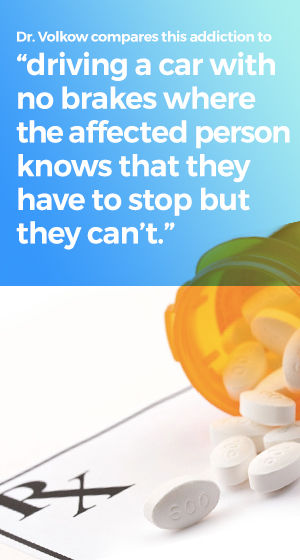We’re back from DIA 2018 and enjoyed a few key topics that are getting attention now as we approach a new era in healthcare. Here’s our takeaway on the keynote “Opioid Epidemic.” Nora Volkow M.D., Director of the National Institute on Drug Abuse (NIDA) at the National Institutes of Health, delivered a powerful, emotional keynote about the opiod epidemic taking place in the U.S.

While I am an avid reader of current news affecting our industry, I felt the topic of addiction was something that affected others until we heard that local high school children are overdosing even when legally prescribed and faithfully administered opioids.
 Of the three factors cited that reduce U.S. life expectancy, opioid overdosing is rapidly increasing and was right next to obesity and suicide. The opioid addiction epidemic gradually progressed over the last 18 years out of the Healthcare system and with the best of intentions. This progression is primarily due to the over reliance on pain meds partially due to the lack of training and/or awareness of the consequences.
Of the three factors cited that reduce U.S. life expectancy, opioid overdosing is rapidly increasing and was right next to obesity and suicide. The opioid addiction epidemic gradually progressed over the last 18 years out of the Healthcare system and with the best of intentions. This progression is primarily due to the over reliance on pain meds partially due to the lack of training and/or awareness of the consequences.
The most sinister aspect of the problem is that opioids actually rewire the brain by changing the receptors thus changing the problem to a physical malady and not a self-control issue. Dr. Volkow compares this addiction to “driving a car with no brakes where the affected person knows that they have to stop but they can’t.” This leads addicted patients to seek more legally prescribed pain medication, or if prevented, attempt to access the seemingly limitless supply of cheap, illegal and ever more powerful narcotics like Fentanyl, which is 50 times more powerful than Heroin. See what the CDC says here.
The speaker then called for collaboration between academia, industry and regulatory bodies to help in this fight:
- Academic research should identify new alternatives that mimic the structure of the opioid molecules and attach to the brain receptors thus preventing the opioids to do same. Unfortunately, the current state of the art with this approach does not work with Fentanyl. She went on to suggest new innovative approaches such as treating the opioid molecules like pathogens and to develop vaccines that attack the molecule and prevent it from reaching the brain where the damage is done.
- The industry can participate in development and distributions of such remedies and novel approaches.
- Regulatory bodies can enforce control of “over prescribing” as well as helping fast-track research.
The keynote ended with a sobering note: “During this 45-minute talk there were 5 overdose deaths in America.”
I want to thank Dr. Volkow and her organization for raising awareness of this major problem facing our nation. I look forward to staying close to this topic of opioid epidemic in the U.S. and the full transparency of its progress towards a solution for a pain-free world. Read Dr. Volkow’s blog here.
Sina Adibi is the CEO of Adaptive Clinical Systems and a veteran of Pharma and Health IT industry.

About Adaptive Clinical Systems
Adaptive Clinical Systems offers a unique, simple, secure, validated, compliant, and cost-effective innovative solution for clinical data integration and interoperability. The cloud-based innovative Adaptive eClinical Bus® solution integrates clinical study data from multiple systems and platforms — EDC, eCOA, CTMS, Medical Imaging, IRT, analytical/data visualization systems and others — to ensure accurate and efficient transfer of clinical data for any study of any complexity while going well beyond simple and difficult to scale integration to full, real-time interoperability.
The award-winning Adaptive eClinical Bus software includes “connectors” for many leading clinical trial software tools from well-known vendors such as Omnicomm, Medidata, BioClinica, and Clinical Conductor to open source clinical trial tools such as OpenClinica and Clinovo. Connectors can also leverage internally-developed and proprietary systems and help customers retain their competitive edge. Adaptive Clinical’s eClinical Bus® can easily integrate technology into an interoperable, efficient, and accurate clinical trials system that streamlines processes and improves data reliability and offers the freedom to choose the best eClinical tools of any third-party or proprietary systems while enjoying all the benefits of a fully integrated system.
